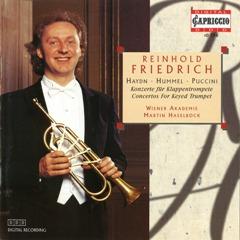Haydn Hummel Puccini – Trompetenkonzerte (Reinhold Friedrich) [1995]
Haydn Hummel Puccini – Trompetenkonzerte (Reinhold Friedrich) [1995]

Haydn Konzert für Trompete und Streicher Es-Dur 1 Allegro 5:52 2 Andante 3:10 3 Allegro 4:48 Hummel Konzert für Trompete und Orchester E-Dur 4 Allegro Vivace - Andante stracco 9:21 5 Andante: Variatione I-V 4:16 6 Larghetto - Allegro vivace 4:32 M.Puccini Konzert für Flöte, Klarinette, Klappentrompete, Horn + Orchester 7 Allegro con spirito 13:11 8 Andante 10:05 9 Rondo 7:03 Reinhold Friedrich – trumpet (1-9) Christian Gurtner – flute (7-9) Hector McDonald - french horn (7-9) Vienna Academy Martin Haselböck – conductor
The keyed trumpet is a fiendish instrument. Invented by the Viennese trumpeter Anton Weidinger at the end of the 18th century, it astonished contemporary audiences by its ability to produce a full chromatic scale, thereby extending the melodic possibilities of the trumpet quite considerably. Although it could produce a ‘gentle’ tone, the instrument nevertheless had inherent sound problems, and the more promising valve mechanism soon came into use. It seems ironic, then, that the trumpet’s two best-known works, the concertos by Haydn and Hummel, were conceived for this instrument. Trumpeter Reinhold Friedrich’s previous recording of these two concertos – on a modern instrument – is the best in the catalogue and, unsurprisingly, this new release displays equally his thoughtful, original interpretative powers and technical assurance. The performance of the Wiener Akademie under Martin Haselböck is marred somewhat by the recessed recording, which loses some of the clarity and immediacy offered by the English Concert, accompanying Mark Bennett in his rival version of the Haydn. A curiosity lies in wait at the end of the disc in the form of the concerto by Michele Puccini (father of Giacomo). Dating from 1838, this piece provides evidence that the keyed instrument remained popular in Italy long after the appearance of the valve trumpet. ---Deborah Calland, classical-music.com
download: uploaded anonfiles 4shared ziddu sugarsync mediafire hostuje gett
